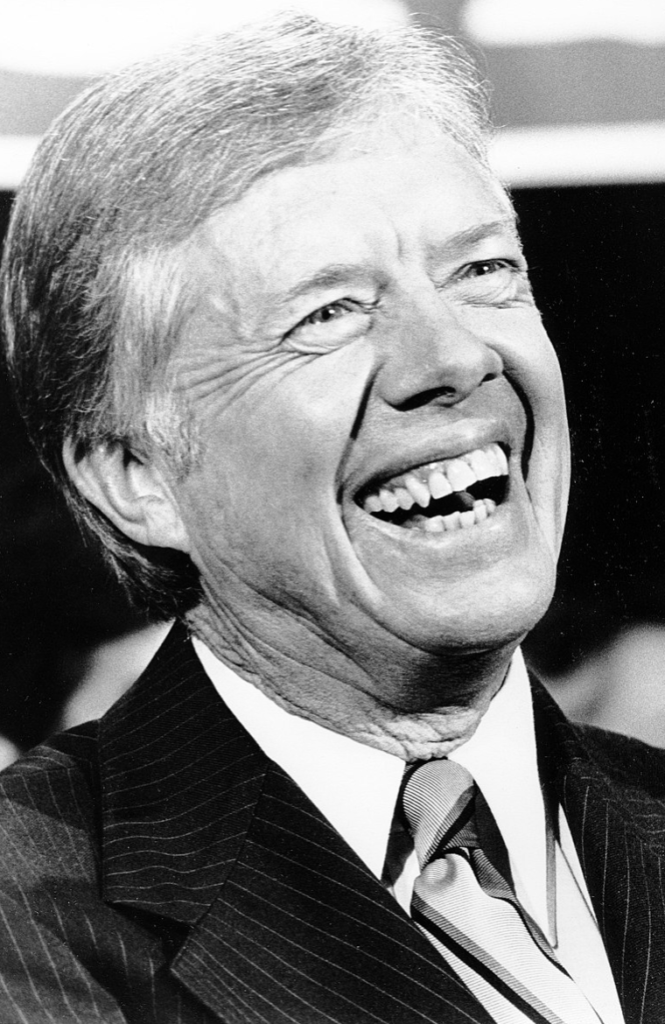Former President Jimmy Carter Leaves a Legacy for the Palestinian People

By: Nissrine Bedda / Arab America Contributing Writer
Former President Jimmy Carter passed away this past Sunday at the age of 100, leaving many Americans reflecting fondly on a leader who was ahead of his time. While our community mourns this loss, we also take this moment to reflect on the challenges of recent years, particularly the ongoing struggles faced by the Palestinian community. Amid efforts to preserve lineage and identity, we stand resilient against the forces of imperialism that seek to diminish and erase Palestinian heritage.
From Plaines, Georgia, the proudly Southern President put Palestinians on the map through the work he did for the Palestinian people, using his platform as President to establish a diplomatic effort to preserve the Palestinian lineage, and publicly shame nations that were in favor of an Israeli-apartheid state bounded to hostile treatment of Palestinians, which he mentioned to be, “worse than the conditions seen in South Africa” back in 2006.
Palestine: Peace Not Apartheid
President Jimmy Carter’s book, Palestine: Peace Not Apartheid, represents a significant milestone in American history after his presidency. Despite facing accusations of anti-Semitism and bigotry, Carter uses this work to bring continued recognition to the plight of the Palestinian people and to examine the conditions under Israeli occupation in Palestinian territories. Through this book, Carter exposes the stark realities of the situation, highlights the deep divisions between the two groups, and concludes that the system of apartheid perpetuates conflict rather than fostering peace.
In an interview with Democracy Now! back in 2006 to promote the book, he mentions profoundly “Some people have said the title is provocative, and I accept that categorization, but I don’t consider the word “provocative” to be a negative description, because it’s designed to provoke discussion and analysis and debate in a country where debate and discussion is almost completely absent if it involves any criticism at all of the policies of Israel. And I think the book is very balanced.”
The former President consistently used his influence and former power to speak out in critical spaces, addressing issues that needed attention both during the polarized political climate of his time and, perhaps even more importantly, today. It has long been evident that our political environment tends to turn their heads over criticism of the Zionist-backed parliament, which has maintained its position in government and continues to exert significant influence over American policy and funding.
How Would You Like to be Remembered?
“I’d like to be remembered as a champion of peace and human rights. Those are the two things I’ve found as a kind of guide for my life. I’ve done the best I could with those, not always successful, of course. I would hope the American people would see that I tried to do what was best for our country every day I was in office.” — 2014 CNBC interview.
Guided by a commitment to peace and human rights advocacy, he emerged as a remarkable president, championing the cause of the oppressed. Back in 2016, the former president urged the Obama administration to recognize Palestinian statehood before leaving office January 20 sending a political and diplomatic pressure for the Obama administration to make a serious humanitarian change in the Middle East before the far-right Trump administration would take office.
Marking a significant shift in American history, reminiscent of the transition when Carter left office following his loss to the Reagan administration—which championed the message of “making America great”—it was no surprise that Carter sought to reaffirm the dignity and rights of the Palestinian people, recognizing that such efforts would ultimately benefit the American people as well.
Listen up America!
After his passing this past Sunday, it crosses my mind to take this time to remember the accomplishments of the Carter administration. From the Camp David Accords that were administered back in 1978 which brought together Egyptian President Anwar Sadat and Israeli Prime Minister Menachem Begin, along with the President Jimmy Carter; this symbol of diplomatic allegiance marked the success of a historic peace treaty.
As we witness yet another wave of severe oppression and the inhumane killing of the Palestinian people, exposing the true nature of the Zionist regime supported by American political powers, we must take this moment to stand firmly with humanity—just as President Carter once stood for the rights and dignity of people worldwide.
We, as American people, tend to carry this self-centered agenda while forgetting about our impacts that we make to the rest of humanity. It is now important, more than ever before, to remember to use our voices as our voices represent power of the people, the Palestinian people. Jimmy Carter leaves a legacy behind followed by the work caused by simple curiosity. It wasn’t until he traveled to the West Bank that he felt the need to reveal the secrets that he believed America’s political powers were hiding from their own citizens. When asked “why don’t Americans know what you have seen?” he simply replied: “Americans don’t want to know… the Israeli’s don’t want to know what it happening inside of Palestine”.
Surely, we must remember how the power of curiosity allows us to learn and grow, and spread a message and open our perspectives to the raw choices of our governments that are preferred than protecting the rights of marginalized groups like the Palestinian land and their heritage.
Check out our blog!








